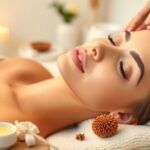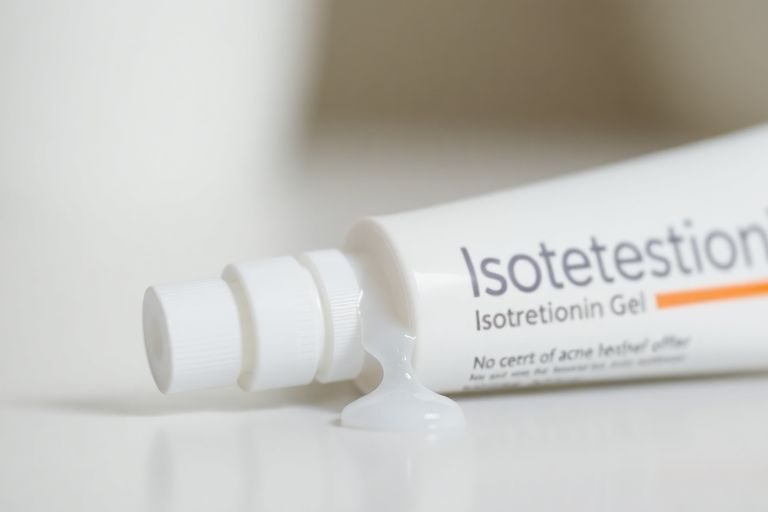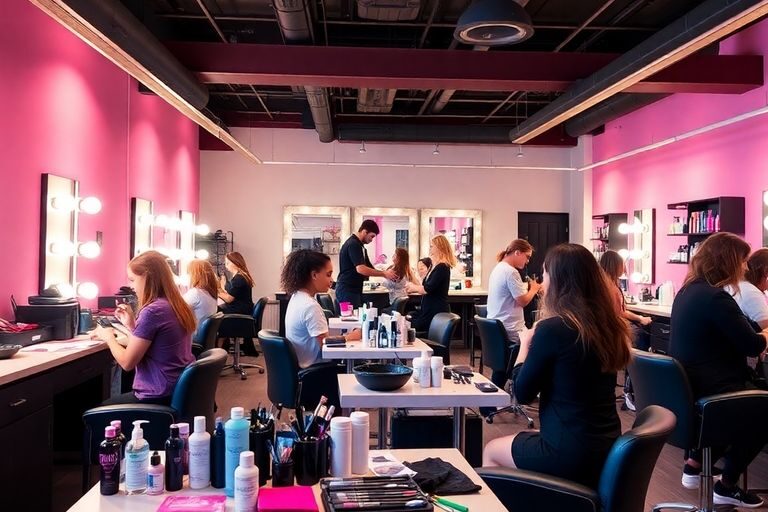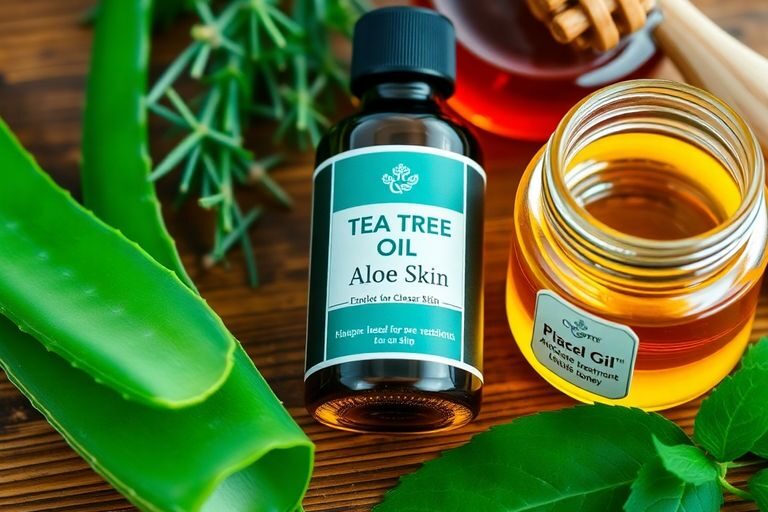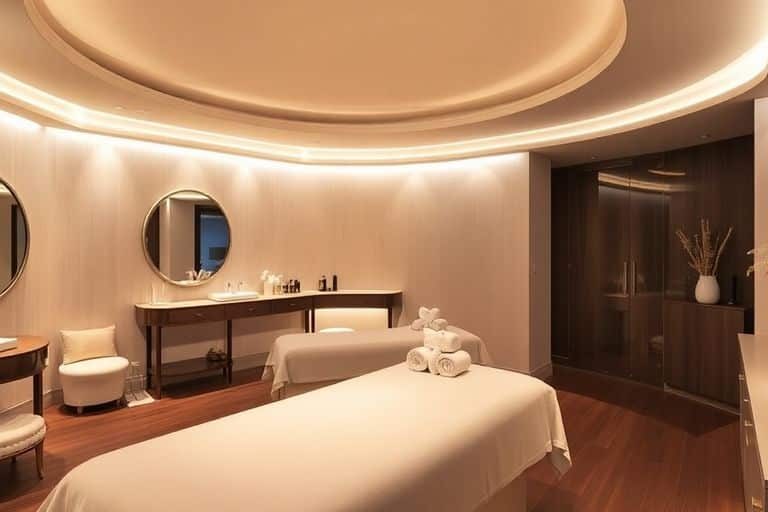Acne can be a real pain, not just for your skin but also for your confidence. Finding the right skincare routine is key, but it’s just as important to know what to avoid. Some ingredients can make your acne worse instead of better. In this article, we’ll explore those pesky skincare ingredients to avoid acne, helping you to achieve a clearer complexion without the hassle.
Key Takeaways
- Steer clear of mineral oil, alcohol, and synthetic fragrances as they can worsen acne.
- Avoid harsh physical scrubs and opt for gentle chemical exfoliants instead.
- Comedogenic oils like coconut oil can clog pores, leading to breakouts.
- Be cautious with preservatives like parabens and sulphates that may irritate sensitive skin.
- Always read ingredient labels to identify potential acne triggers in your skincare products.
Common Ingredients That Worsen Acne
It’s a bit of a minefield out there, isn’t it? Trying to navigate the world of skincare when you’re battling acne can feel like a constant uphill struggle. You’re trying to do the right thing for your skin, but sometimes, the very products you’re using could be making things worse. Let’s have a look at some common culprits that might be sabotaging your quest for clear skin.
Mineral Oil and Its Effects
Mineral oil is in loads of products, from moisturisers to makeup removers. It’s cheap and it creates a barrier on the skin, which can feel nice and hydrating. However, for acne-prone skin, this barrier can be a problem. It can trap dead skin cells and sebum, leading to clogged pores and, you guessed it, more spots. I always check the ingredients list for this one, especially in heavier creams.
Alcohol: The Drying Agent
Alcohol in skincare is a tricky one. On one hand, it can make products feel lighter and absorb quicker. On the other hand, it can be incredibly drying. When your skin is stripped of its natural oils, it can go into overdrive to produce more, which can then lead to more breakouts. It’s a vicious cycle! I tend to avoid products with alcohol high up on the ingredients list. If you are looking for acne skin care products, make sure to check the label.
Fragrance and Skin Sensitivity
Oh, fragrance. It makes everything smell so nice, doesn’t it? But for sensitive skin, it can be a nightmare. Synthetic fragrances are a common cause of irritation and allergic reactions. And irritated skin is more prone to breakouts. I’ve switched to fragrance-free options where I can, and it’s made a noticeable difference.
It’s worth remembering that everyone’s skin is different. What triggers one person’s acne might not affect another. The key is to pay attention to how your skin reacts to different ingredients and adjust your routine accordingly.
Harsh Exfoliants to Avoid

I’ve learned the hard way that not all exfoliants are created equal, especially when you’re battling acne. Some can actually make things worse, leading to more irritation and breakouts. It’s all about finding the right balance and knowing what to steer clear of.
Physical Scrubs and Micro-Tears
Those grainy scrubs that promise to sleugh away dead skin? They might sound appealing, but for acne-prone skin, they can be a nightmare. The harsh particles can cause micro-tears in the skin, leading to inflammation and irritation. Think of it like this: you’re essentially scratching your face, which can spread bacteria and worsen existing acne.
- Avoid scrubs with large, uneven particles like walnut shells or apricot kernels.
- Be wary of anything that feels too abrasive on your skin.
- Remember, gentle is key when it comes to exfoliation.
Chemical Exfoliants: The Right Choice
When it comes to exfoliation, I’ve found that chemical exfoliants are generally a much better option for acne-prone skin. They use acids to dissolve dead skin cells, rather than physically scrubbing them away. This is much gentler and less likely to cause irritation. Salicylic acid is a great option, and you can find it in many acne skin products.
- AHAs (alpha-hydroxy acids) like glycolic acid can also be effective, but start with a low concentration.
- Always patch-test new products to see how your skin reacts.
- Don’t overdo it – exfoliating too often can damage your skin’s barrier.
Gentle Alternatives for Acne-Prone Skin
If you’re worried about harsh exfoliants, there are plenty of gentle alternatives to consider. These options focus on removing dead skin cells without causing irritation or inflammation. I’ve found that incorporating these into my routine has made a big difference.
- Enzyme peels use natural enzymes to break down dead skin cells.
- Konjac sponges are soft and gentle, providing a mild exfoliating effect.
- Consider using an ultralight moisturiser to keep your skin hydrated and healthy.
It’s important to listen to your skin and adjust your exfoliation routine accordingly. What works for one person might not work for another. If you’re unsure, consult a dermatologist for personalised advice.
Comedogenic Oils to Steer Clear Of
I’ve been there, slathering on what I thought was a moisturising oil, only to be greeted by a face full of angry spots a few days later. It’s frustrating, right? That’s why I want to talk about comedogenic oils – the ones that are more likely to clog your pores and cause breakouts. Not all oils are created equal, and knowing which ones to avoid can make a huge difference to your skin.
Coconut Oil and Pore Clogging
Coconut oil is a big one that gets a lot of hype, and I get why. It smells amazing and feels lovely on the skin initially. However, coconut oil is highly comedogenic for many people, meaning it’s very likely to clog pores. If you’re prone to acne, especially those stubborn blackheads and whiteheads, coconut oil might be a culprit. It’s rich in fatty acids, which, while moisturising, can trap dead skin cells and bacteria in your pores. I’d suggest patch-testing it first, or avoiding it altogether if you know your skin is sensitive.
The Risks of Heavy Oils
Heavy oils, in general, can be problematic for acne-prone skin. Think about oils like cocoa butter, palm oil, and wheat germ oil. These oils have a thicker consistency and tend to sit on the skin’s surface, making it easier for them to clog pores. It’s like putting a barrier on your skin that traps everything underneath. I’ve found that lighter oils are generally a better bet, as they absorb more easily and are less likely to cause issues. If you’re not sure, always check the comedogenic rating of an oil before using it. You can manage acne by avoiding these heavy oils.
Choosing Non-Comedogenic Options
So, what are the alternatives? Thankfully, there are plenty of non-comedogenic oils that won’t clog your pores. Here are a few of my favourites:
- Rosehip Oil: This is a great option for its anti-inflammatory and antioxidant properties. It’s also lightweight and absorbs quickly.
- Grapeseed Oil: Another lightweight oil that’s rich in linoleic acid, which can help to balance oil production in the skin.
- Jojoba Oil: This is technically a wax ester, but it mimics the skin’s natural sebum, making it a good choice for balancing oily skin. It’s also non-comedogenic.
Remember, everyone’s skin is different, so what works for me might not work for you. It’s always a good idea to do a patch test before introducing a new oil into your skincare routine. Apply a small amount to a discreet area of your skin and wait 24-48 hours to see if you have any reaction.
Here’s a quick guide to some common oils and their comedogenic ratings (0 being non-comedogenic, 5 being highly comedogenic):
| Oil | Comedogenic Rating |
|---|---|
| Coconut Oil | 4 |
| Olive Oil | 2 |
| Rosehip Oil | 0-1 |
| Grapeseed Oil | 1 |
| Jojoba Oil | 2 |
Keep in mind that these ratings are just a guide, and your skin might react differently. Pay attention to how your skin feels and looks after using a new oil, and adjust your routine accordingly. And if in doubt, consult a dermatologist for personalised advice.
Preservatives That Can Irritate

It’s easy to overlook preservatives, but they’re vital for keeping our skincare products fresh and safe. However, some can be a bit harsh, especially if you’re prone to acne. I’ve learned that being mindful of these ingredients can make a big difference in keeping my skin clear.
Formaldehyde and Its Alternatives
Formaldehyde is a preservative I definitely try to avoid. It’s a known irritant and can cause allergic reactions. Luckily, many brands are moving away from it and using safer alternatives. Some common alternatives include:
- Benzyl alcohol: Possesses natural antimicrobial properties but may irritate sensitive skin.
- Sodium benzoate: Commonly used in natural skincare products as a preservative.
- Potassium sorbate: Another mild preservative often found in gentler formulations.
Parabens: What You Need to Know
Parabens have been a hot topic for years. They’re used to prevent the growth of bacteria and mould in products. While some studies have raised concerns about their potential effects, regulatory bodies generally consider them safe in low concentrations. Still, if you’re worried, it’s easy enough to find paraben-free options these days. I always check the label just to be sure.
Sulphates and Skin Health
Sulphates, like Sodium Lauryl Sulphate (SLS), are surfactants that create that foamy lather we often associate with cleansers. The problem is, they can be quite stripping, removing too much of the skin’s natural oils. This can lead to dryness, irritation, and even trigger more acne. I’ve found that switching to sulphate-free cleansers has helped calm my skin down a lot. Look for products that use milder alternatives, such as coco-glucoside or decyl glucoside. These are much gentler on the skin while still effectively cleansing.
It’s worth noting that everyone’s skin reacts differently. What irritates one person might not bother another. The key is to pay attention to how your skin feels after using a product and adjust your routine accordingly. Keeping a skincare diary can be really helpful in identifying potential triggers.
Understanding Alcohol in Skincare
Alcohol in skincare? It’s a bit of a minefield, isn’t it? Some say it’s the devil, others shrug it off. Let’s break down what’s really going on, especially if you’re battling acne.
Types of Alcohols in Products
Not all alcohols are created equal. There are the ‘good’ fatty alcohols, like cetyl and stearyl alcohol, which actually help moisturise and stabilise formulas. Then there are the ‘bad’ alcohols, like alcohol denat and isopropyl alcohol, which are often used as solvents or to help products absorb quickly. It’s these latter ones we need to watch out for.
How Alcohol Affects Acne-Prone Skin
For those of us with acne-prone skin, alcohol can be a real trigger. It strips away natural oils, leading to dryness and irritation. This, in turn, can cause your skin to overproduce oil to compensate, leading to more breakouts. It’s a vicious cycle!
- Dries out the skin.
- Irritates sensitive areas.
- Can disrupt the skin’s natural barrier.
I’ve found that when I use products high in alcohol, my skin feels tight and uncomfortable almost immediately. Then, a few days later, bam! Breakouts galore. It’s definitely something I try to avoid now.
Finding Alcohol-Free Alternatives
Thankfully, there are loads of alcohol-free options out there these days. Look for products that use hydrating ingredients like hyaluronic acid or glycerin instead. Reading the ingredient list is key – the lower down alcohol is on the list, the less there is in the product. You can also search for alcohol-free toners and moisturisers specifically formulated for sensitive skin.
Fragrance-Free Products for Sensitive Skin
I’ve learned that dealing with acne-prone and sensitive skin is a balancing act. You want to treat the acne, but not irritate your skin further. One of the biggest culprits for irritation? Fragrance. That’s why I’m a huge advocate for fragrance-free products, especially if you’re prone to breakouts.
The Impact of Synthetic Fragrances
Synthetic fragrances are everywhere, and while they might make your skincare smell amazing, they’re often a cocktail of chemicals. These chemicals can trigger allergic reactions, inflammation, and, you guessed it, more acne. It’s like adding fuel to the fire if you’re already dealing with sensitive skin. I’ve personally experienced redness and itching from fragranced products, and it’s not fun.
Natural Fragrance Options
Okay, so maybe you still want a little something in terms of scent. Some products use natural fragrances, like essential oils. But even these can be irritating for some people. If you’re going this route, patch test first! A tiny bit on your arm, wait 24 hours, and see if you react. Some essential oils are less likely to cause problems, but it’s always better to be safe than sorry. You can find a facial cleanser that suits your skin type.
Benefits of Fragrance-Free Formulations
Here’s the thing: fragrance-free doesn’t mean your skincare has to smell bad. Many fragrance-free products have a neutral scent, or maybe a very faint smell from the ingredients themselves. The real benefit is what isn’t there – the irritants! By cutting out fragrance, you’re reducing the risk of inflammation, redness, and breakouts. Plus, fragrance-free products are often gentler overall, which is a win for sensitive skin.
Switching to fragrance-free skincare was a game-changer for me. My skin is less reactive, less red, and I’ve definitely seen a decrease in breakouts. It might seem like a small change, but it can make a big difference.
Here’s a quick rundown of why I think fragrance-free is the way to go:
- Less irritation: Fewer chemicals mean less chance of a reaction.
- Reduced redness: Fragrances can cause inflammation, leading to redness.
- Fewer breakouts: Irritation can trigger acne, so cutting it out helps.
- Gentler formulas: Fragrance-free products are often designed for sensitive skin.
The Importance of Ingredient Labels
Reading Labels for Acne Management
Okay, so you’re serious about getting rid of acne? Then you absolutely have to become best friends with ingredient labels. Seriously, it’s like having a secret weapon. Understanding what you’re putting on your face is half the battle. I used to just grab whatever looked pretty, but trust me, that’s a recipe for disaster. Now, I meticulously scan every label before anything even gets near my skin. It’s about knowing what to look for – and what to avoid.
Identifying Problematic Ingredients
So, what are these sneaky culprits we need to watch out for? Well, it varies from person to person, but there are some common offenders. I’ve found that certain ingredients consistently cause issues for acne-prone skin. Here’s a quick rundown:
- Comedogenic ingredients: These are pore-clogging nightmares. Coconut oil is a big one for me, even though it’s raved about. Mineral oil can also be a problem.
- Irritants: Fragrances, alcohol, and certain preservatives can irritate the skin, leading to inflammation and breakouts. My skin hates artificial fragrances.
- Harsh exfoliants: Over-exfoliating can strip your skin and make things worse. I learned that the hard way with a super abrasive scrub.
It’s all about trial and error, but keeping a log of what you use and how your skin reacts can be a game-changer. I started a little skincare journal, and it’s helped me pinpoint exactly what my skin doesn’t like.
Educating Yourself on Skincare
Honestly, the more you know, the better. I’ve spent hours researching active ingredients in skincare and their effects, and it’s made a massive difference. Don’t just rely on marketing claims; dig deeper. Look up ingredients on reliable websites, read reviews, and see what other people with acne-prone skin are saying. It’s empowering to take control of your skincare and make informed choices. Plus, you’ll feel like a total skincare guru!
Final Thoughts on Achieving Clear Skin
In summary, if you’re battling acne, being mindful of what goes on your skin is key. Avoiding ingredients like mineral oil, alcohol, and harsh fragrances can make a real difference. Instead, focus on gentle, non-comedogenic products that support your skin’s health. Remember, everyone’s skin is unique, so what works for one person might not work for another. It’s all about finding the right balance and sticking to a routine that suits you. With a bit of patience and the right approach, clearer skin is definitely within reach.
Frequently Asked Questions
What ingredients should I avoid if I have acne-prone skin?
You should stay away from mineral oil, alcohol, and fragrances, as they can irritate your skin and worsen acne.
Are physical scrubs bad for acne?
Yes, physical scrubs can cause tiny tears in your skin, leading to irritation. It’s better to use gentle chemical exfoliants.
Is coconut oil good for acne?
Coconut oil can clog pores, which may lead to more breakouts. It’s best to use non-comedogenic oils instead.
What preservatives should I look out for?
Avoid products with formaldehyde and parabens, as they can irritate sensitive skin.
Why is alcohol in skincare bad for acne?
Alcohol can dry out your skin, leading to irritation and more oil production, which can worsen acne.
How can I find fragrance-free products?
Look for products labelled as ‘fragrance-free’ or those that use natural ingredients for scent, which are usually gentler on the skin.


